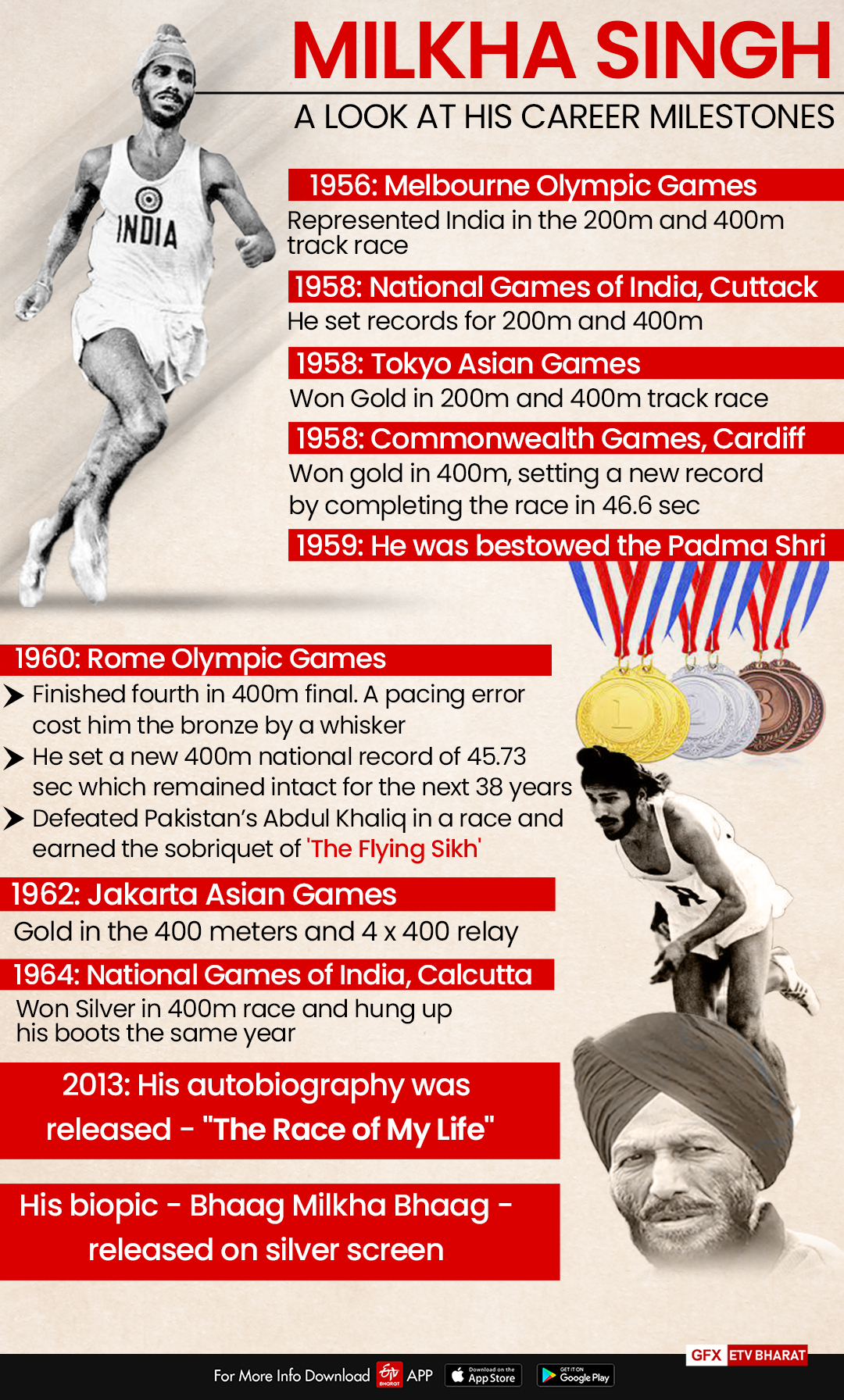Hyderabad: Invariably the most famous Indian to dominate the track and field for over a decade with lightning speed and spirit, Milkha Singh had created an aura in a country where athletics has received little support. Despite a multitude of challenges and hurdles, Milkha had successfully set a legacy for himself in Indian sports. Born on 20 November 1929 in a Sikh family in Govindpura, Pakistan, village boy Milkha's tryst with sprinting started in a very unfortunate manner.
Caught in ethnic cleansing, Milkha had to pull a sprint to save his life from a mounted swordsman. He had to run against the horse. On that occasion, the frightened boy managed to save his life. Sprinting came naturally to Milkha. A sport that had protected him from getting murdered would later become his biggest source of motivation and honour.

After taking refuge in India fleeing from his "home" in Pakistan, Milkha got involved in all manly mischievous things. But once the young, energetic man got enrolled in the Indian Army, his rather laid-back life took a U-turn: for better. He prepared himself as a sprinter running in the Secunderabad cantonment track. He didn't look back afterwards. The rigid training of Army, discipline and diet made him sharper and fitter, and soon he established himself as India's most prominent individual sports star, winning one after another medal in first-rate events.
After Milkha finished sixth in a cross-country race that had around 400 more soldiers running, he was handpicked for further training. That laid the foundation for what would be an impressive career. The country's most revered track and field legend, Milkha first represented India at the 1956 Olympics in Melbourne, and then in the 1960 Rome Olympics and 1964 Tokyo Olympics which made him the tallest Olympian among all his coevals from India. Later, his phenomenal performances even made him the best sprinter in Asia.
Also Read: Legendary athlete Milkha Singh passes away at 91
In the Melbourne Games, his maiden appearance, a neophyte Milkha couldn't impress. He participated in 200m and 400m heats. In both cases, he failed to qualify for the medal round. But, Milkha returned home as a changed sprinter. His outlook towards running has changed after meeting legendary United States athlete Charles Jenkins, who bagged the gold in both 400m individual race and 4x400m relay in the 1956 Olympics.
On his return from Melbourne, a matured Milkha kept himself busy in improving his track time. His dedication, hard work and passion for running, in his own words, turned him into "a running machine". Two years later in Cardiff, UK, his meticulous preparations got him the reward. In the 1958 National Games, he had set national records winning the 200m and 400m in Cuttack. In Tokyo, he repeated the national feats winning the Asian Games gold in both races the same year.
His golden run continued. This time, he took the Commonwealth Games track by storm winning the 400m gold with a record time of 46.6 seconds. This made him independent India's first gold medallist in CWG. He remained the only Indian male to have an individual athletics CWG gold for 56 years before discus thrower Vikas Gowda in the 2014 edition.
By the time the 1960 Rome Olympics was around the corner, Milkha had earned a moniker, "Flying Sikh" from the then Pakistan army general Ayub Khan after the Indian defeated his arch-nemesis "The Flying Bird of Asia", Abdul Khaliq, a two-time Asiad gold medallist in 100m. In the Rome Games, Milkha came close to making it to the Olympic podium. Running in the 400m, Milkha Singh was leading at the halfway mark with his competitors lagging behind him. But as he had decided to ease off, others overtook him, costing him the much desired Olympic gold.
Also Read: PM Modi speaks to Milkha Singh, enquires about his health
Milkha finished fourth, notching 45.73s behind Otis Davis of the US, Carl Kaufmann of Germany and Malcolm Spence of South Africa. A golden chance was wasted, which neither Milkha nor his successors could ever achieve. But, his fourth-place finish in the track and field is still India's best in the Olympics.
Though the Olympic medal eluded Milkha, he had always been India's most respected track icon. Years later, after bidding his passion, running, a goodbye, he had penned down his autobiography titled, “The Race of My Life”, which he published on July 28, 2013 with the help of his daughter Sonia Sanwalka. The book was later adapted to the silver screen with Farhan Akhtar playing Milkha Singh in the legendary biopic "Bhaag Milkha Bhaag".



